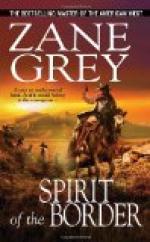Silvertip saw his fatal mistake, but he uttered no sound. Crippled, though he was, he yet made a supreme effort, but it was as if he had been in the hands of a giant. The lad handled him with remorseless and resistless fury. Suddenly he grasped the knife, which Silvertip had been unable to hold with his crippled hand, and thrust it deeply into the Indian’s side.
All Silvertip’s muscles relaxed as if a strong tension had been removed. Slowly his legs straightened, his arms dropped, and from his side gushed a dark flood. A shadow crept over his face, not dark nor white, but just a shadow. His eyes lost their hate; they no longer saw the foe, they looked beyond with gloomy question, and then were fixed cold in death. Silvertip died as he had lived—a chief.
Joe glared round for Girty. He was gone, having slipped away during the fight. The lad turned to release the poor prisoner, when he started back with a cry of fear. Kate lay bathed in a pool of blood—dead. The renegade, fearing she might be rescued, had murdered her, and then fled from the cabin.
Almost blinded by horror, and staggering with weakness, Joe turned to leave the cabin. Realizing that he was seriously, perhaps dangerously, wounded he wisely thought he must not leave the place without weapons. He had marked the pegs where the renegade’s rifle hung, and had been careful to keep between that and his enemies. He took down the gun and horns, which were attached to it, and, with one last shuddering glance at poor Kate, left the place.
He was conscious of a queer lightness in his head, but he suffered no pain. His garments were dripping with blood. He did not know how much of it was his, or the Indian’s. Instinct rather than sight was his guide. He grew weaker and weaker; his head began to whirl, yet he kept on, knowing that life and freedom were his if he found Whispering Winds. He gained the top of the ridge; his eyes were blurred, his strength gone. He called aloud, and then plunged forward on his face. He heard dimly, as though the sound were afar off, the whine of a dog. He felt something soft and wet on his face. Then consciousness left him.
When he regained his senses he was lying on a bed of ferns under a projecting rock. He heard the gurgle of running water mingling with the song of birds. Near him lay Mose, and beyond rose a wall of green thicket. Neither Whispering Winds nor his horse was visible.
He felt a dreamy lassitude. He was tired, but had no pain. Finding he could move without difficulty, he concluded his weakness was more from loss of blood than a dangerous wound. He put his hand on the place where he had been stabbed, and felt a soft, warm compress such as might have been made by a bunch of wet leaves. Some one had unlaced his hunting-shirt—for he saw the strings were not as he usually tied them—and had dressed the wound. Joe decided, after some deliberation, that Whispering Winds had found him, made him as comfortable as possible, and, leaving Mose on guard, had gone out to hunt for food, or perhaps back to the Indian encampment. The rifle and horns he had taken from Girty’s hut, together with Silvertip’s knife, lay beside him.




